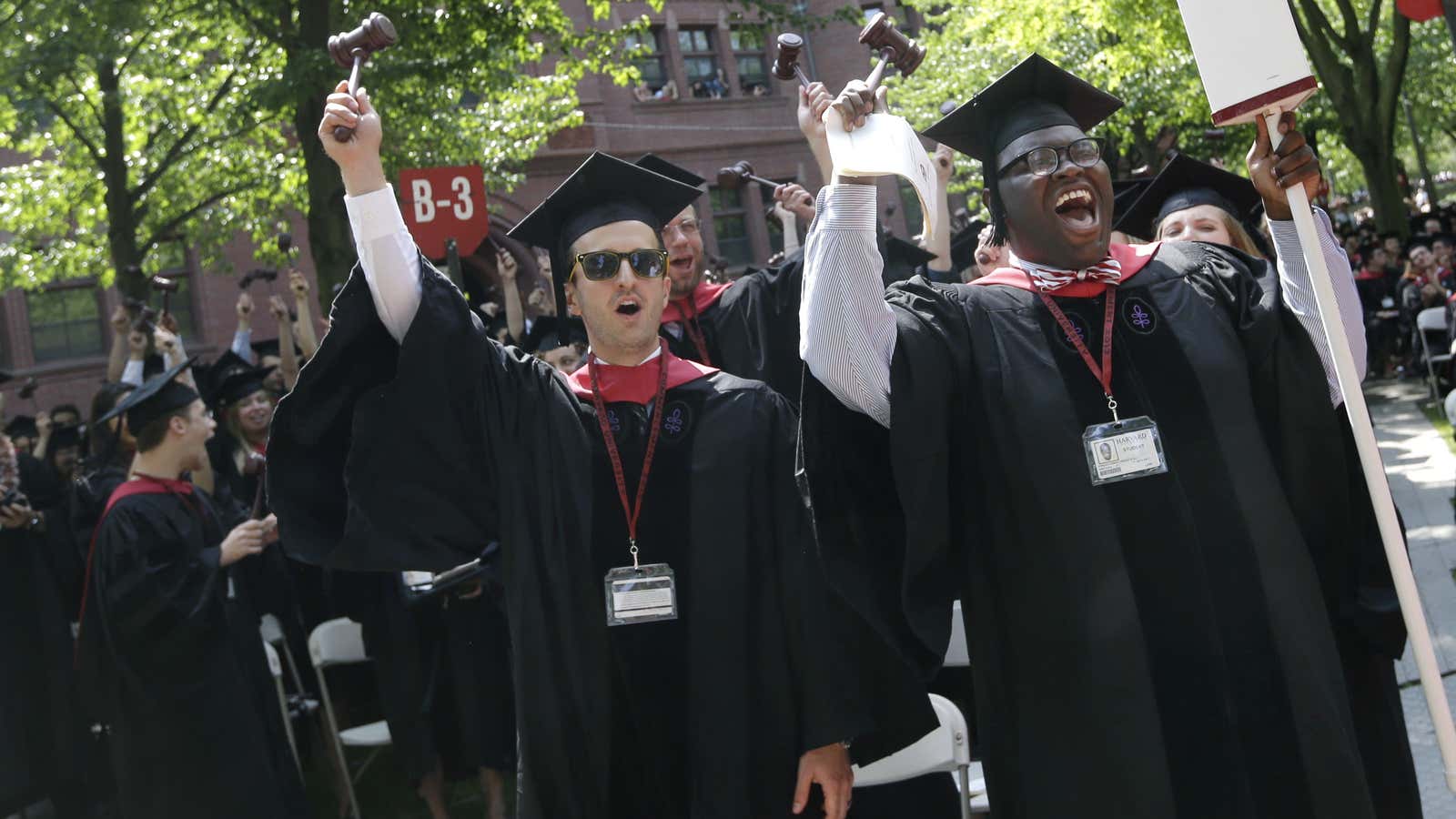Racism is so pervasive in the US job market that even black Americans with Harvard degrees are at a disadvantage, according a 2014 study in the journal Social Forces (highlighted in Inside Higher Ed).
Using carefully designed test resumes submitted for job openings, the researchers found that black graduates of elite universities such as Harvard, Stanford, and Duke were as likely to get responses from employers than white graduates of much less prestigious state colleges, such as University of California, Riverside, the University of Massachusetts, Amherst, and University of North Carolina, Greensboro.

For both the races tested, there was a difference of about 6 percentage points between the response rates for graduates of state schools and those of elite schools. But that gap widens to 11 percentage points when you compare white elite college graduates to black graduates from the state schools. And it narrows to just 1.5 percentage points, within the margin of error, between white state school graduates and black graduates of prestigious schools.
University of Michigan sociologist S. Michael Gaddis, who conducted the study, expected a gap between elite and state colleges, he tells Quartz, and he expected a gap between black and white applicants overall. He did not expect, however, to see that even among elite schools’ graduates, there was a big gap between whites and blacks.
“If we really think that education is the great equalizer, then someone who reaches the pinnacle of that system…should be rewarded pretty equally,” Gaddis says. “I would have been surprised, to be honest with you, to see no gap at all. But to see that the gap for Harvard and the other elite applicants was basically the same was very discouraging.”
The jobs had starting salaries ranging from about $31,000 to $38,000, and the salary data also skewed lower for black candidates. They received responses from jobs with a listed salary of $3,071 less than the jobs that reached out to white applicants, according to the study.
Gaddis discovered these inequalities by sending almost identical resumes and cover letters to 1,008 employers. The imaginary candidates either majored in business or psychology, and they had comparable grades, job experience, and campus involvement.
The only differences were their names—meant to signal race to the employers—and the colleges they had attended. The white applicants were Caleb, Charlie, Ronny, Aubrey, Erica, and Lesly. The black applicants were Jalen, Lamar, DaQuan, Nia, Ebony, and Shanice. (The names he chose reflected statistically common names of children born to women of each race in New York, of varying levels of education.)
There are some drawbacks to this methodology, Gaddis says. It’s unclear how many of these applicants actually would have received job offers, as it would be unethical and practically difficult to actually have the fictional candidates do interviews.
And many Americans do not have racially identifying names. It’s unclear how these biases would play out if a black applicant named “Mark Washington” applied for a job, then went in for an in-person interview.
The state of the labor market may also play a role in the results. Gaddis conducted this study in 2011, when the recession had a chokehold on the US economy and employers weren’t thinking as much about diversity, he says. He wants to replicate the study next year under better economic conditions, when hiring managers are able to prioritize finding candidates that are both qualified and diverse.
A study released last year found that black men who signaled on their resumes that they were gay (an affiliation with an LGBT group, for example) might overcome anti-black job market bias, thanks to this very twisted logic:
“[S]tereotypes of black men being “more aggressive”—which negatively impacted applicants’ chances—were effectively cancelled out by “the feminine stereotype” of gay men.”
The findings indicate, Gaddis says, that as well as company diversity policies, hiring managers should recognize their own unconscious biases—and try to overcome them.
